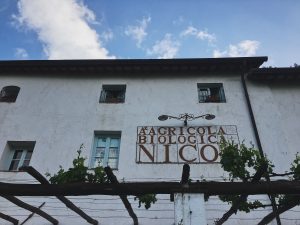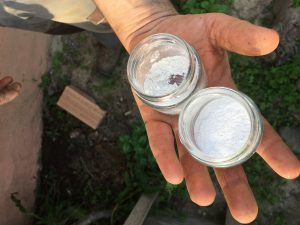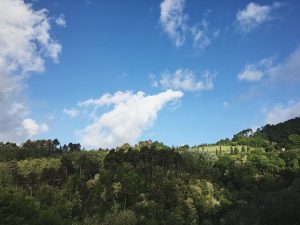I’m on a train heading to Siena, where I will spend the next three weeks on a sheep farm learning about animal husbandry and cheese making. I’m taking three trains, Lucca to Pisa, Pisa to Empoli, and Empoli to Siena, followed by a bus ride to the small town Rosia, outside of Siena, where my host family will pick me up. Basically, I have a lot of time to think about my time at Nico.
I went to Nico to learn about biodynamic farming, and like many people who have traveled and lived with families of different cultures than their own, I got so much more than I could have hoped. First, I want to address my current thoughts on biodynamic farming in comparison to my original ideas about this practice, but remember that all I really knew about it was the horn and the moon. Okay, sure it does seem a little voodoo esc, but Federico and his family seemed like any small organic farming operation that you would encounter in the states, but the Italian version. I asked him why he switched to biodynamic farming and he said that when you talk to conventional farmers and even organic farmers they’re always talking about all of the pests and weeds they have and how they are going to get rid of them. In biodynamics, farmers aren’t trying to mask the symptoms, they’re trying to cure the problem with incredibly healthy, living soil. It’s a very involved practice, Federico would work about 12 hours a day Monday-Saturday, and Sundays were spent around the house with his family and fixing the stone wall that collapsed from heavy rains. Biodynamic farming is certainly a lifestyle, one which you have to deeply love, but I think that’s true for all types of farming. My father and my uncles all had a very similar work schedule as conventional farmers. Farming is hard. I definitely do not agree with conventional practices, it was a quick fix to the rigorous rural farming lifestyle that has proven to be incredibly detrimental to the food system and the environment as a whole. Thus, I can see why people fall in love with biodynamic farming. It’s a holistic approach to farming, and if you’re interested in sustainable agriculture I highly advise you to look into biodynamic farming because it’s acutely in tune with nature, to the point of incorporating the cosmos in all of the work from seeding, transplanting, sowing, and weeding.
After reading Katherine Cole’s book Voodoo Vintner I was on the side that if you don’t make your own preparations, are you even really a biodynamic farmer? I totally agreed with this, until I talked to Federico. He doesn’t make any of his preparations other than 500, he gets them from a local woman who is a master at making them and tries to help her when he can. He brought up a point that Cole hadn’t considered, that is making the preparations is very difficult. If you don’t know exactly what you’re doing you could very well mess them up, so perhaps you should leave it to a professional, and if possible help them in the process. Additionally, he gets his finely ground quartz from another local biodynamic farmer, but he prepares the spray on site. I think this is a wise approach, not only are you sure that you are getting high quality preps, but you’re also building a strong community of biodynamic farmers in your area.
I also talked to Federico about how it seems like there are so many aspects to biodynamic farmer, he advised to start out slowly. Incorporate a few aspects of the practice at a time rather than trying to take it all on at once. When Federico started he only sprayed 500. Because we don’t live in a vacuum, and as an Evergreen student I like to look for as many intersections between subjects as possible, this is great advice for almost any major transition you make in life. If you want something to last and to work it’s unrealistic to completely change your lifestyle, or career, or whatever and expect those changes to continue for the long haul. Take small steps and you will learn more, be less frustrated, and have a more fruitful payoff in the end.
Spending time in the kitchen with Elena and at the table with the family, farm workers, and friends was of equal importance to my experience. I have so many new ideas on what to cook for myself and friends in the future, which I plan to do a lot of once I return. Here are a few ideas rolling around in my head: rice cooked in broth with vegetables is definitely on the list, and also lasagna! I think I should be able to cook a pretty solid ragù, which was a base for so many dishes. I love how there is usually some sort of frittata as a side dish, and simply steamed vegetables, especially beets, they love beets and chard. Though I haven’t yet made this, I want to try to make their version of a “cake” which is more like a pie, but instead of fresh fruit they use jam, or marmalade as they call it in Italy.
Clearly, I’m feeling inspired. I asked Elena when she learned how to cook, and she said it was when they started the agrotourism business. She followed that up with saying that the food is not as important as the table, meaning eating at the table with her family and friends. How lovely and perfect of a sentiment.
Something completely unexpected that I learned was that I really like children. I’m not around children that often, I was the youngest in my family, and it’s not as though I didn’t like them before I just didn’t know what to do with them. Maybe having a language barrier helped, but I had so much fun with their children. Chloé was the oldest (8), followed by Tideg (6), Anaïs (5), and Yèsa (5 months). They all had such distinct personalities, and if I’m being honest they could get out of control, one of them usually had a meltdown during dinner, and the joke of the family was that the one word I learned in Italian was “basta”, which means “stop/that’s enough” because I had to say it to the children quite a few times. Regardless of the chaos, they were so sweet and fun, you can’t expect for children to always behave, they’re little humans that are learning how to exist in the world, and it was wonderful to see these kids being kids. Elena didn’t rely on television to distract them, they played outside, Chloé was reading most of the time, they went for walks, and they colored in coloring books. I miss them so much, and I hope I can go back when they’re older, and when I know more Italian than “basta.” As Elena pointed out, children are hugely important to farming. Carlo Petrini talks extensively about the Slow Food initiatives on teaching children about the importance of food and flavor. And of course we all know that children are the future.
In summation, I loved my time at Nico. I’m so grateful for their hospitality and willingness to teach me about farming and food culture in Italy. I hope that one day I can return to their farm, or maybe Federico and his family will come to Oregon, he does know a lot of people there now. I chose both, please!
For now, I forge ahead on my journey through Toscana and continue to learn about (and hopefully adopt) the envious way of Italian living and dining!
Ciao ciao for now!


